|
Look East
: 17 November 2005
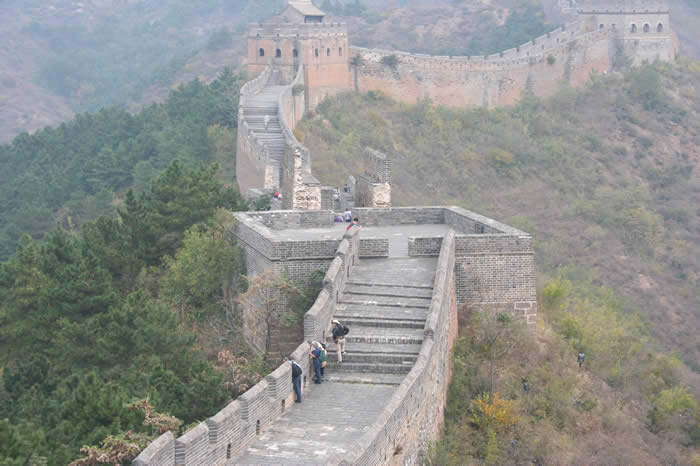
I have just come back from a sightseeing tour of China. The holiday covered many of the usual tourist attractions, including the terra cotta army at Xian.
The terra cotta army has a special significance for the Chinese. Its soldiers guard the tomb of their most controversial emperor. The buried man succeeded in uniting China after a period of division into warring states. He put an end to feudalism, built the first Great Wall, divided the country into provinces, and appointed governors who were directly accountable to him. He standardised the system of weights and measures, and also the Chinese characters, which had previously differed from one warring state to the next. Our name for China derives directly from this great “Ch’in” emperor.
This “first emperor” tried to secure his regime by insisting that the old feudal ruling families , whose kingdoms he had conquered, should build new palaces at his own capital, Hsien Yang, and live a life of luxury at his court, in much the same way as Louis XIV summoned the French nobility to Versailles. In a vain attempt to stamp out any harking back to the old feudal ways, he ordered the burning of all books which, in those days, would have been considered to have a content which was not practical or scientific – very much as Hitler did, two millennia later. These included the Confucian classics. People caught keeping or hiding the forbidden books were condemned to death.
In spite of its achievements, the Ch’in empire lasted less than 15 years. With all literature giving moral guidance suppressed, Ch’in’s governors had few scruples. They soon became corrupt and exploited their offices at the expense of the people. The emperor found it necessary to make frequent visits to the provinces. Ostensibly this was for reasons relating to religion or superstition, but the frequency of the visits suggests the need to keep a close eye on senior officials in a huge empire, where the temptations for disloyalty in the outlying provinces must have been considerable.
The Ch’in empire collapsed following widespread opposition to forced labour, particularly in regard to the building of the Great Wall, and to a loss of credibility in a corrupt administration. There was a peasants’ revolt, and a peasant farmer, Liu Pang, whose first army was a handful of convicts, became the first Han emperor, under the name of Han Kao Ti.
Han Kao Ti took over the Ch’in administration. He came from the same background in the second century BC as Mao Dse Dung in the 20th Century. He may not have been able to read or write, but was clearly a highly intelligent and capable man. He had a choice: either he could rebuild the empire on the same feudal basis as before, and appoint his own family as feudal governors or princes, or he could build on the reforms of the Ch’in emperor. Either way, he would probably have wanted to avoid the corruption and the temptations for disloyalty in the outlying provinces.
It may have been in this context that he received an approach from some Confucian scholars, who asked him to revoke the decree banning their books. Kao Ti’s reaction was to ask: “What do I need scholars or their books for? I won the empire on horseback, didn’t I?” The scholars replied: “You won the empire on horseback, but can you keep it on your horse?” The result provided the enduring key to the future success of Chinese imperial government. Kao Ti kept the essence of the Ch’in administration, but the people he appointed to run the administration were the scholars.
In time this system of government by scholar officials was further refined by the introduction of an elaborate system of local, provincial and national examinations. The system was very successful. It lasted until 1911. Why was it so successful?
Could the reason be that, in order to succeed in the examinations, one had to be highly intelligent, hard-working, highly motivated in accordance with the Confucian classics, and totally dedicated to the Confucian ideal of a unified empire? So it would not matter whether any particular emperor was strong or weak – the administration of the provinces would always continue in what was to become the traditional pattern. The system had a remarkably high degree of political stability. Generally speaking, Chinese dynasties tended to have an average life of three hundred years each.
This contrasts with the Roman Empire, which was inherently unstable, and liable to revolution or civil war the moment the central government showed the slightest sign of weakness. During the four hundred years of the Han dynasty, for example, there were, at Rome, the revolutions or civil wars of the Gracchi, Marius, Sulla, Pompey, Caesar, Anthony and Octavian, the usurpation of absolute power by three “triumvirates”, the establishment of the “Julio-Claudian” dynasty, the year of the four emperors, the Flavian dynasty and finally the rule of the Antonine “five good emperors” (were there only five good ones?), which ended at about the same time as the fall of the Han dynasty.
Or take another example: England during the Ming dynasty: The Ming dynasty started about 30 years after the Battle of Crecy, and covered the periods of the Hundred Years war with France, the wars with Scotland, the Wars of the Roses, the Tudor dynasty, the Stuart dynasty and the Civil War – and England is only a small part of Europe, which saw many other wars and revolutions during this period. Chinese civilisation changed very little under the Ming emperors, but the Ming empire covered the period of the great European Renaiscence, and at the end of Ming rule, China was still technologically in advance of Europe.
The British Empire in the 19th Century may well have copied the Chinese form of administration by scholar officials. The bedrock of the Chinese empire was the “Hsien Guan”, which can be translated as “the district official”: the provinces of the British Empire in Africa, for example, were administered by “District Officers”. The Chinese district official or mandarin would have had to pass the imperial examinations on the Confucian and other classics of Chinese literature. The senior British official Officer was usually a graduate of Oxford or Cambridge, and, generally, had a degree in an academic subject such as Classics. Is this just a coincidence? And was China the inspiration for our examination system?
The Chinese imperial administration had its weaknesses. It encouraged the kind of conservatism which inhibited technological progress. So, the Chinese invented paper, printing, gun powder, the compass, steel and many other things before they appeared in Europe, but progress was gradual, measured and incremental, and rapid change like the Industrial Revolution in Europe was inconceivable in the old China, and caught the empire unprepared. It was this innate conservatism which eventually brought about the downfall of the imperial system. In 1898 the Chinese mandarinate opposed the “100 days of Reform” of the emperor Kwangsu, and supported the empress dowager Tzu Hsi in a palace revolution against him. That turned out to be the last chance the empire had to adapt to the modern world and resulted in the fall of the Ch’ing dynasty, the empire and the mandarin system. Consequently China became exposed to all the evils of revolution, partition, division, invasion, corruption and civil war on a scale unprecedented in the country’s history.
Modern China may have now found herself at the cross roads with the same kind of choice as faced Kao Ti, more than two thousand years ago. The Communist experiment has largely failed to produce the happiness, social harmony and prosperity it promised to deliver. Capitalism has been encouraged in order to feed China’s millions. Then there was the Tien An Men demonstration. This may have taken the Communist Party completely by surprise. Since then careful consideration must have been given to the future.
The Chinese Communist Party, like all earlier Chinese rulers, would probably wish to hang on to power, if at all possible. They might consider following a democratic path, with a view to ensuring they win an election. Alternatively, they may prefer to continue to run a benevolent but nevertheless autocratic form of government with velvet glove in the traditional way, where commercial and personal freedom is allowed, but political freedom is not.
Either way, a cynic might suggest that members of the Central Committee might now see no harm in allowing the people to rediscover the glory and splendour of the country’s history of benevolent imperial rule. They are already regretting the excesses of the Cultural Revolution and might come to regard Confucius as a friend.
One of the surprises of modern China is the way tourism has taken off for the Chinese. Most of the travel restrictions within China which used to apply to citizens of the People’s Republic have been lifted and every historic monument was full of crowds of enthusiatic Chinese tourists. The visitors to the Terra Cotta Army who were not Chinese nationals were a very tiny minority. We visited several monuments where we saw no sign of other Europeans, but the Chinese were there in their thousands.
Another surprise comes from education. The Chinese are very keen to learn English, and English and world history are compulsory subjects. Other compulsory subjects, I understand, include the study of some Chinese classics (including Confucius and the Tang poets of the 8th and 9th Centuries) in the original Classical language – which is probably more difficult for the Chinese than Chaucer is for us. This is a far cry from the Cutural Revolution and the Red Guards who wanted to rid China of old ways, old ideas and old attitudes, when the schools were virtually closed for almost ten years.
As far as we could gather, education and state support for education seems to vary from province to province and from the urban to the more remote rural areas. In Taiwan, children start learning Classical Chinese from an early age and have to read two or three pages of the Confucian Classics every week, as well as Tang dynasty poetry. In mainland China, we were told that children also start Classical Chinese from an early age, beginning with simple texts and progressing to more difficult ones.
Perhaps there is a lesson here for us. The Chinese have always valued an academic education. In the old China, this gave the officials a deep sense of right and wrong and enhanced the quality and the integrity of the administration. It has been said that the “Hsien Guan” had the elements of a “Methodist pastor in Georgia and a revenue agent in Kentucky”. We too used to value an academic education, but this has become displaced by an emphasis on “practical” subjects. Confucius died before Socrates was bourn, but how many schools nowadays teach Classical Greek or Latin? How many English schools teach philosophy or ethics at all? It is now possible to go through school and university without having to study a single Shakespeare play or read a single novel by an author like Dickens. When we forget our country’s classics, we abandon the values and lessons which their authors intended to pass on to us, and we lose our own cultural integrity. Should we then be surprised if crime and wrongdoing have become rampant, and our politicians less and less believable?
So, when we see pictures of the terra cotta army, those figures should have a far deeper significance for us as well as for the Chinese than the ranks of ancient soldiers they represent.

PA & Di on the Great Wall

Altar, Headstone and tomb of Confucius, Confucius Forest, QuFu


The Chin emperor's mobile battlefield headquarters
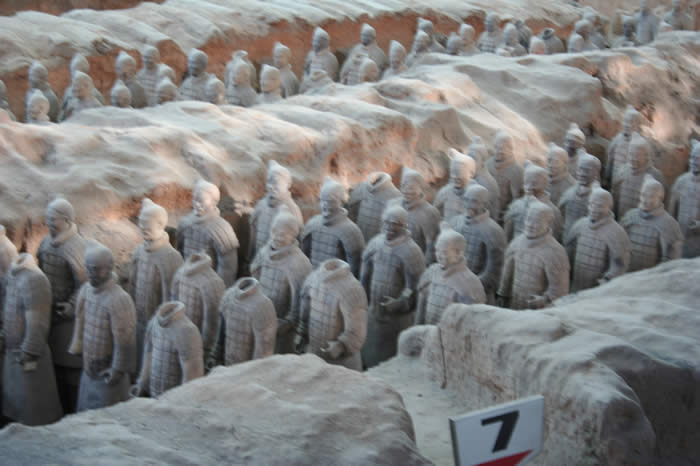
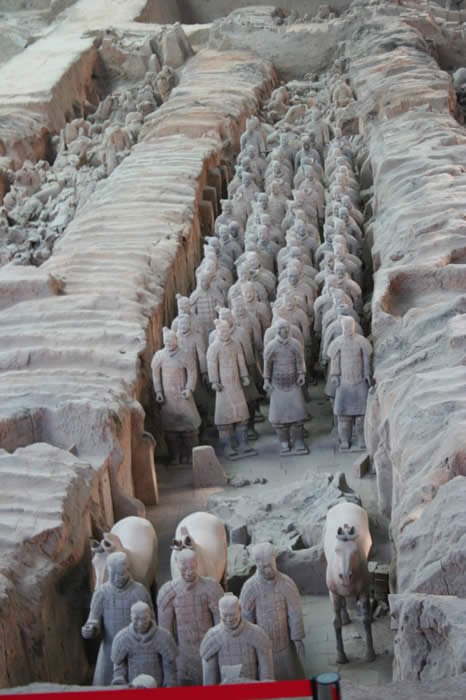
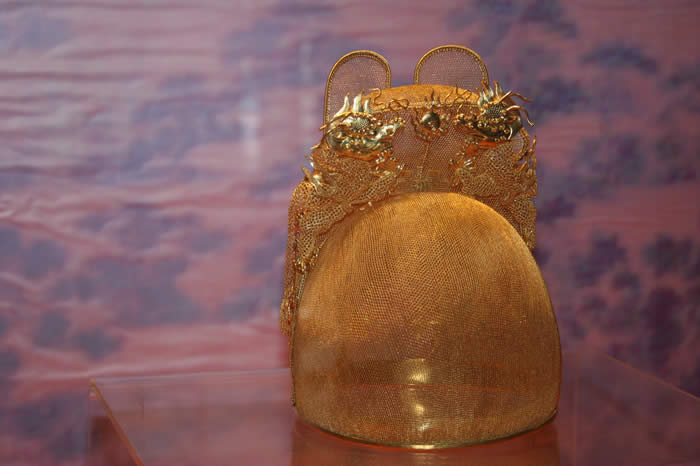
The Ming Imperial Crown
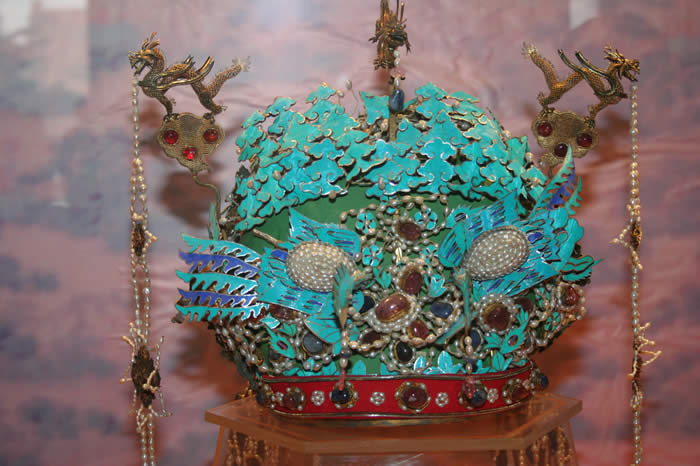
The Ming Empress's Crown |